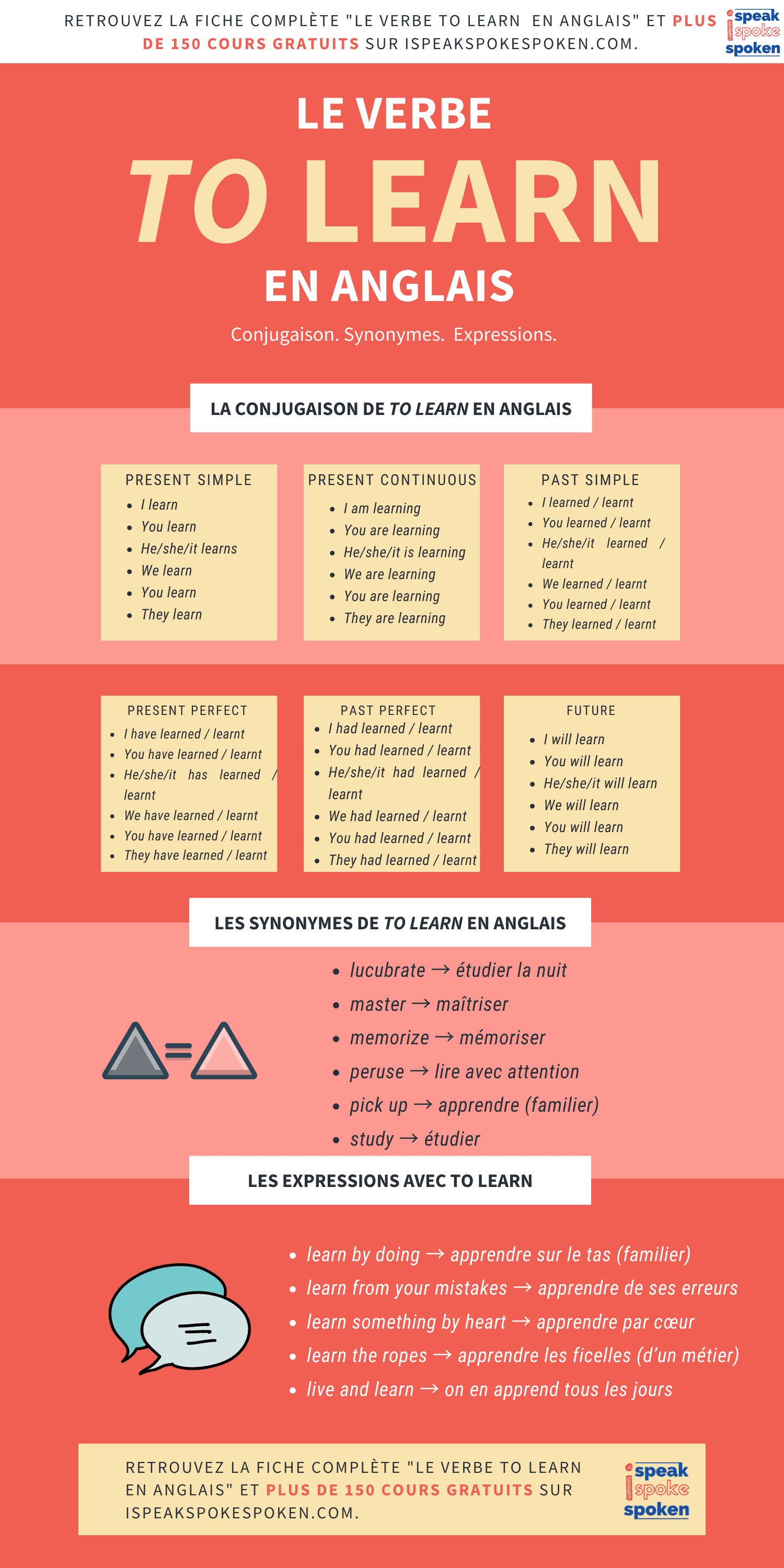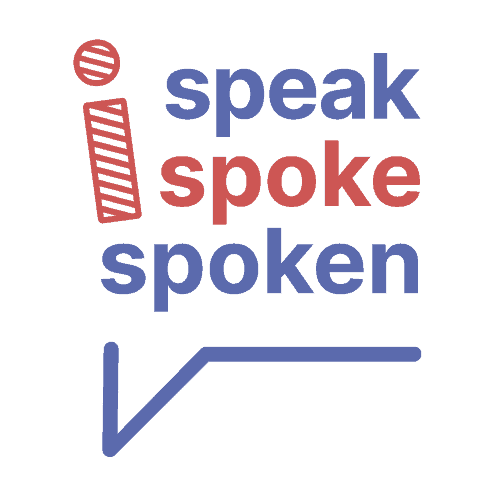Apprenez tout sur la conjugaison de learn en anglais : ses temps et modes, mais également ses définitions, synonymes, expressions et phrasal verbs !
Tableaux de conjugaison de learn en anglais
Conjugaison du verbe learn à l’indicatif
Le verbe learn au present simple
- I learn
- You learn
- He/she/it learns
- We learn
- You learn
- They learn
Le verbe learn au present continuous
- I am learning
- You are learning
- He/she/it is learning
- We are learning
- You are learning
- They are learning
Le verbe learn au past simple
- I learned / learnt
- You learned / learnt
- He/she/it learned / learnt
- We learned / learnt
- You learned / learnt
- They learned / learnt
Le verbe learn au past continuous
- I was learning
- You were learning
- He/she/it was learning
- We were learning
- You were learning
- They were learning
Le verbe learn au present perfect
- I have learned / learnt
- You have learned / learnt
- He/she/it has learned / learnt
- We have learned / learnt
- You have learned / learnt
- They have learned / learnt
Le verbe learn au present perfect continuous
- I have been learning
- You have been learning
- He/she/it has been learning
- We have been learning
- You have been learning
- They have been learning
Le verbe learn au past perfect
- I had learned / learnt
- You had learned / learnt
- He/she/it had learned / learnt
- We had learned / learnt
- You had learned / learnt
- They had learned / learnt
Le verbe learn au past perfect continuous
- I had been learning
- You had been learning
- He/she/it had been learning
- We had been learning
- You had been learning
- They had been learning
Le verbe learn au future
- I will learn
- You will learn
- He/she/it will learn
- We will learn
- You will learn
- They will learn
Le verbe learn au future continuous
- I will be learning
- You will be learning
- He/she/it will be learning
- We will be learning
- You will be learning
- They will be learning
Le verbe learn au future perfect
- I will have learned / learnt
- You will have learned / learnt
- He/she/it will have learned / learnt
- We will have learned / learnt
- You will have learned / learnt
- They will have learned / learnt
Le verbe learn au future perfect continuous
- I will have been learning
- You will have been learning
- He/she/it will have been learning
- We will have been learning
- You will have been learning
- They will have been learning
Conjugaison du verbe learn au conditionnel
Le verbe learn au conditional present
- I would learn
- You would learn
- He/she/it would learn
- We would learn
- You would learn
- They would learn
Le verbe learn au conditional present continuous
- I would be learning
- You would be learning
- He/she/it would be learning
- We would be learning
- You would be learning
- They would be learning
Le verbe learn au conditional perfect
- I would have learned / learnt
- You would have learned / learnt
- He/she/it would have learned / learnt
- We would have learned / learnt
- You would have learned / learnt
- They would have learned / learnt
Le verbe learn au conditional perfect continuous
- I would have been learning
- You would have been learning
- He/she/it would have been learning
- We would have been learning
- You would have been learning
- They would have been learning
Les autres formes
L’infinitif de learn
- to learn
Participe présent de learn
- learning
Participe passé de learn
- learned / learnt
L’impératif de learn
- learn
- let’s learn
À l’instar de to lead, to go, to drink, to bear et to sing, to learn est un verbe irrégulier. Il faut donc faire particulièrement attention aux formes du passé.
Définition de learn en anglais
Que veut dire le verbe learn en anglais ?
Le Cambridge Dictionary donne plusieurs définitions du verbe learn.
Penchons-nous sur les principales :
1. To get knowledge or skill in a new subject or activity
I’ve been learning Arabic for 2 years.
→ J’apprends l’arabe depuis 2 ans.
2. To make yourself remember a piece of writing by reading it or repeating it many times
This technique helped the actress learn her lines effortlessly.
→ cette technique a aidé l’actrice à mémoriser son texte sans effort.
3. To start to understand that you must change the way you behave
She has to learn that things can change.
→ Elle doit se faire à l’idée que les choses peuvent évoluer.
4. To be told facts or information that you did not know
We were all surprised when we learned the news.
→ Nous avons tous été surpris quand nous avons appris la nouvelle.
Pour accéder à l’intégralité de la page du Cambridge Dictionary, cliquez ici !
Les phrasal verbs avec learn en anglais
Rappel : les phrasal verbs (ou “verbes à particule”) sont des verbes qui, lorsqu’ils sont suivis d’un autre mot (la particule), voient leur sens initial complété ou modifié.
Voici les principaux phrasal verbs formés sur le verbe learn :
- learn about something → entendre parler de quelque chose
- learn from somebody/something → apprendre de quelqu’un/quelque chose
- learn of something → apprendre (le décès de quelqu’un, par exemple)
Les synonymes de learn en anglais
En fonction du contexte, vous pouvez remplacer le verbe to learn par l’un des verbes suivants :
- gain → acquérir (une information)
- get → comprendre, piger (familier)
- grasp → comprendre, piger (familier)
- lucubrate → étudier la nuit
- master → maîtriser
- memorize → mémoriser
- peruse → lire avec attention
- pick up → apprendre (familier)
- study → étudier
Expressions avec learn en anglais
- learn a thing or two → apprendre deux ou trois choses (familier)
- learn all about something → tout savoir de quelque chose, tout savoir sur quelque chose
- learn by doing → apprendre sur le tas (familier)
- learn from your mistakes → apprendre de ses erreurs
- learn something by heart → apprendre par cœur
- learn something the hard way → apprendre quelque chose à ses dépens
- learn the ropes → apprendre les ficelles (d’un métier)
- learn your lines → apprendre son texte (au théâtre ou au cinéma)
- live and learn → on en apprend tous les jours


